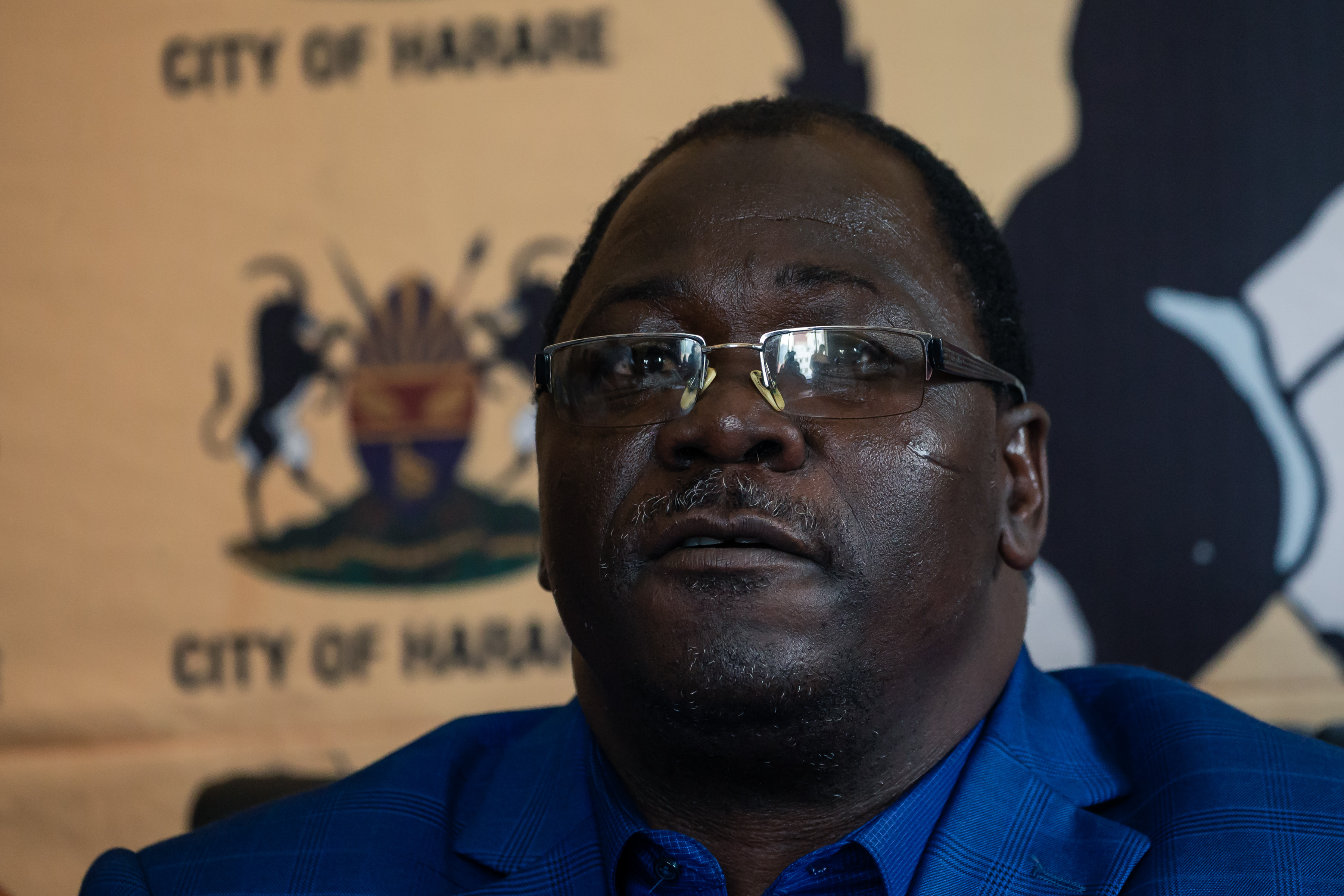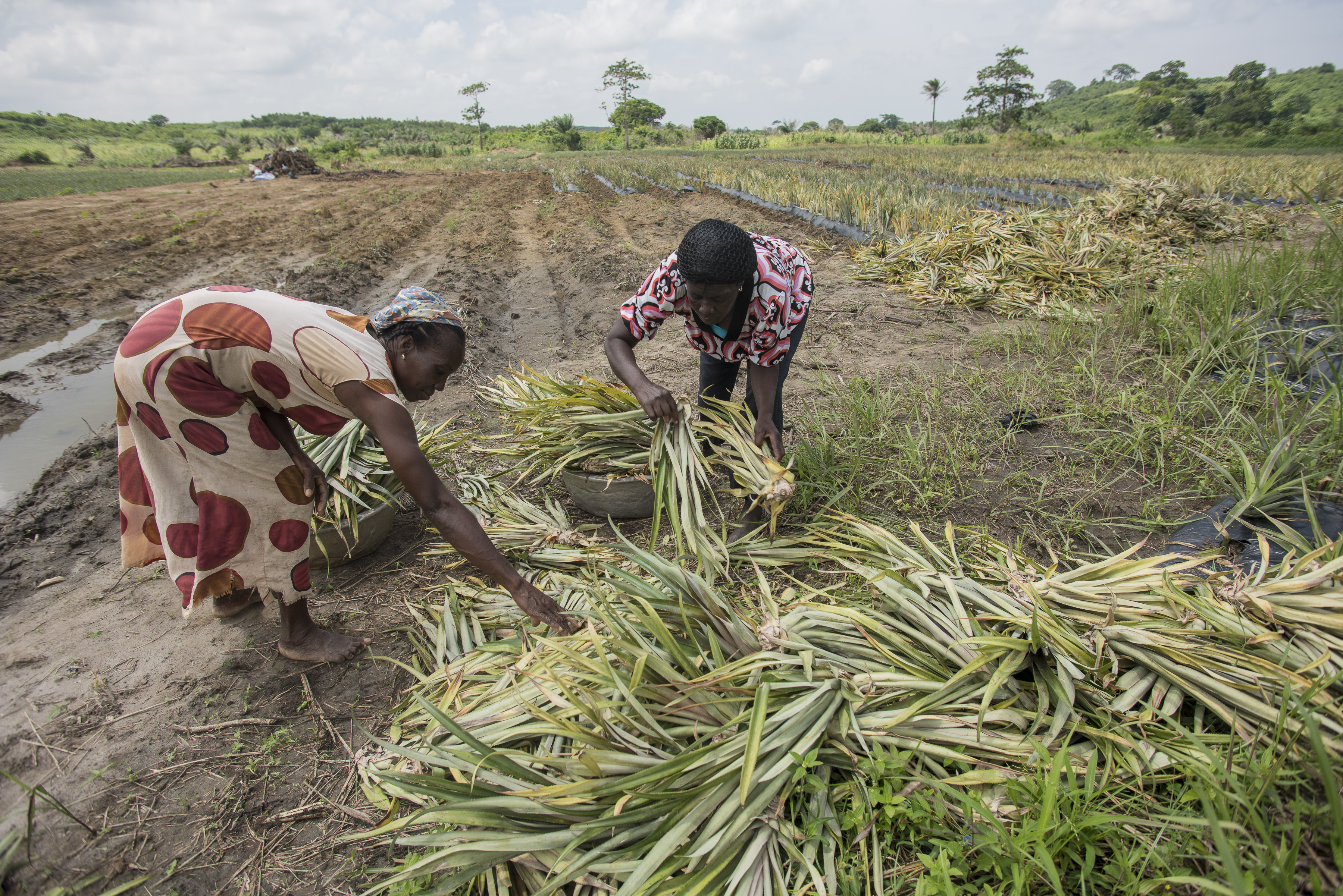Land invasions and illegal development threaten the source of water to Zimbabwe’s capital.
Once referred to as the “Sunshine City” – not only because the sun shines on Harare most days of the year, but because of its cleanliness and orderliness – Zimbabwe’s capital city has over the years lost its glamour and beauty. The sun is still shining in Harare, but the beauty and orderliness have long disappeared. The days of uninterrupted water and electricity supplies have become a distant memory; streetlights have disappeared in most suburbs, the well-maintained treelined streets have been replaced with potholed roads, while flowing sewage is now a common sight in most high- density suburbs.

Residents of Glen View township queue for water at a borehole as the city’s municipal water treatment facilities close in Harare, September 2019 Photo: AFP
Harare was a model city in the 1980s and 1990s, with the once popular First Street being the epitome of the central business district’s beauty. The street boasted expensive boutiques and prominent departmental stores, as well as well-maintained pavements, water fountains, flowers and trees. Now it is a pale shadow of its former glorious self. Moreover, just as the city has lost its glitz and glamour, the expansive network of wetlands around the city is disappearing. Harare is built on a wetland and actually sits on its own catchment area.
Environmentalists, water rights activists and human rights campaigners believe the city’s future is under threat because of both the legal and illegal use of the wetlands. In recent years politically connected land barons have invaded and allocated land – including wetlands – to home seekers. City of Harare (CoH) officials have also allocated land, or approved development and the commercial abstraction of water from the wetlands, in violation of the law.
With Zimbabwe in economic turmoil and many people losing their jobs as companies fold, the invasion of wetlands for agricultural purposes has also become pronounced, threatening their existence. A report by a special committee chaired by Councillor Charles Joshua Nyatsuro on commercial land sales and leases in the City of Harare, dated 24 June 2019, prepared for the mayor of Harare, Hebert Gomba, and made available to Africa in Fact, highlighted the widespread development on wetlands, including protected sites:
“Harare is in and around the headwater wetlands of its catchment basin at the very beginning of the Manyame (Marimba, Mukuvisi and Gwebi Rivers) and the Mazowe River systems. Greater Harare lies within the source of its water,” the report reads. “Some of these wetlands are protected by the Ramsar Convention. The Government Gazette 380 of 2013 declares 26 wetlands in Harare as protected areas. The committee through field visits and in-depth interviews identified 32 areas designated as wetlands where illegal development is taking place. We find therefore that there is massive development on several sites.”
The committee, which also included residents’ association leaders, found that there “is no single activity or initiative in the last three years to protect wetlands in CoH”, adding “this is a serious concern and threatens the city’s water system.” On threats to wetlands, the committee concluded that: “By far the biggest threat to wetlands is unregulated developments (squatter camps and land barons) and illegally approved developments on wetlands by private developers and the City of Harare. The City of Harare has allocated land on wetlands.”
A commission of inquiry into the sale of state land in and around Zimbabwe’s urban areas since 2005, chaired by Justice Tendai Uchena, last year exposed vote-buying by ruling Zanu-PF politicians who illegally grabbed and parceled out state land, including wetlands, to lure votes. More than 100 people, among them prominent politicians, were implicated in the alleged grab and sale of state land in Harare or corruptly allocating themselves stands. Among those are former first lady Grace Mugabe, former women affairs, gender and development minister Nyasha Chikwinya and former local government minister Ignatius Chombo, as well as several legislators and high-ranking government officials.
The most notable project on Harare’s wetlands in recent years is the construction of Long Cheng Plaza Mall in Belvedere at a cost of more than $200 million. Construction of the mall by Chinese company Anhui Foreign Economic Construction Corporation – which is also in a diamond mining partnership with Zimbabwe’s military – was allowed to go ahead, despite protests from residents, legislators and the Environmental Management Agency. The mall was officially opened in 2014 and opened to the public in 2015. Former Mabvuku-Tafara legislator James Maridadi fought hard in parliament to have the mall demolished, arguing its existence disturbed the natural ecosystem of the capital city’s water supply.
In 2018, Maridadi proposed a motion in parliament to have wetlands preserved, saying water problems in Harare and other cities were a result of the destruction of natural water reservoirs. Speaking in parliament, he said: “One typical example is the Long Cheng Plaza in Belvedere. Madam Speaker, the Long Cheng Plaza sits in the heart of wetlands in Zimbabwe. What that plaza has done is to compromise all underground water to the south and the east of that plaza. If you want to sink a borehole in Belvedere, you must sink beyond 70 metres because of that plaza.”
Development on Harare’s wetlands is occurring despite the fact that Zimbabwe is a signatory to the Ramsar Convention on Wetlands (1971) through which member states committed to maintaining the ecological character of wetlands and to plan for their wise and sustainable use. Zimbabwe also has provisions for the protection of wetlands under the Environmental Management Act (Cap 20;27), Statutory Instrument 7 of 2007 on Environmental Management (Environmental Impact Assessment and Ecosystems Protection) Regulations and Government Gazette 380 of 2013. The Town and Country Planning Act, Urban Councils Act and Traditional Leaders Act, also criminalise the destruction of wetlands.

Deputy Mayor Enock Mupamawonde speaks on the capital’s water woes, September 2019 Photo: AFP
In addition, Section 73 of the Constitution protects environmental rights and states that the environment should be protected for the benefit of future generations. Section 73(b) specifically highlights that everyone must work to prevent ecological degradation and promote conservation. According to the Ramsar Convention, wetlands are areas where water is the primary factor controlling the environment and the associated plant and animal life.They occur where the water table is at or near the surface of the land or where the surface is covered by water.
Zimbabwe’s Environmental Management Act 20:27 defines wetlands as “areas of marsh, fen, peat-land or water whether natural or artificial, permanent or temporary, with water that is static or flowing, fresh, brackish or salt, including riparian land adjacent to the wetland”.
Wetlands filter water naturally by breaking down harmful pollutants, including chemicals, separating them from the water and using them as fertiliser for the vegetation growing there. They are natural sewage systems as they filter water and the water running out of them into rivers is clear and purified. In times of heavy rain, wetlands act as holders of water, like sponges, and prevent flooding in their areas. They absorb and purify water that would otherwise be mostly lost as run-off. The water absorbed throughout the rainy season is slowly released into rivers and streams in the dry seasons.
Wetlands also help to recharge the water table. In addition, they are the habitat for hundreds of species at a time. Government and CoH officials acknowledge the importance of wetlands and the fact that the future of Harare is under threat because of their destruction. For instance, speaking at a wetland’s indaba in Harare in February, Gomba admitted that irresponsible behaviour and political pressure to settle people on wetlands has contributed to the pollution of Lake Chivero, the city’s major source of water.
“Lake Chivero is now heavily polluted, largely through human action,” he said. “It should have been decommissioned a long time ago, but we are still using it because there is no other source of water. The problems of water in Harare also stem from the destruction of wetlands through illegal settlements and farming activities.” He urged politicians to desist from encouraging people to settle on wetlands, ch which could only result in less water for the city. During commemorations to mark World Wetlands Day in Harare in February, the environment minister, Mangaliso Ndlovu, told journalists that land barons were responsible for the illegal settlements in the city. Infrastructure development through commercial and housing construction had turned Harare’s wetlands “into a concrete jungle”. He warned that by 2040, the wetlands may have disappeared.
Selestino Chari, the project manager of Harare Wetlands Trust, told Africa in Fact that Harare residents were paying the price for the unsustainable and illegal exploitation of wetlands. “As we speak, Lake Chivero is not gaining water and the water entering the lake is heavily polluted. “He added that the water entering the lake was no longer being purified by the wetlands. The Harare city council now needed 12 chemicals to treat water, when it had only needed one or two in 1992, he told Africa in Fact.
Dewa Mavhinga, the southern Africa director of Human Rights Watch, told Africa in Fact that the lack of appreciation of the value and importance of wetlands by residents, CoH and government officials was jeorpadising Harare’s future. Harare had run out of land for residential purposes, so politicians were using the few remaining open spaces to advance their political fortunes. “When faced with the question of addressing the housing needs of people or protecting wetlands, there is a tendency for council and government officials to tilt towards what they see as the immediate need, which is housing,” he said.
Harare was now facing “massive water crises” as a direct result of the depletion of wetlands. Underground water has been hugely depleted. “I was speaking to an organisation that is drilling boreholes and they told me that the water table had been between 30 and 40 metres [underground] in many suburbs in Harare, but now it is between 70-90 metres,” he said. From a human rights point of view, the unsustainable use of wetlands has contributed to the violation of people’s right to water, and endangering citizens. Dealing with the Covid-19 pandemic, for example, requires water for good hygiene.
As Mavhinga put it: “Without water, the right to health cannot be guaranteed.” Fiona Iliff, a projects lawyer for the Zimbabwe Lawyers for Human Rights’ (ZLHR) Access to Justice Unit, has fought numerous court battles with the CoH and private developers to preserve wetlands. She says there is an urgent need for all wetlands in Harare to be mapped and gazetted as protected areas. In a 2018 document titled ‘Legislation and the Protection of Harare’s Wetlands: Procedures and Problems’, ZLHR said the Environmental Management Act – the main law protecting the environment – is “mostly substantively sound, but procedurally weak” because enforcement mechanisms do not give wetlands sufficient importance and protection.
ZLHR has recommended that an independent Environment Commission be established, that the National Environmental Council be re- established, and that an Environment Tribunal with punitive jurisdiction to investigate environmental law violations also be established. “The tribunal should be composed of legally trained commissioners with expertise in environmental issues and have punitive jurisdiction,” ZLHR said. “Legislation should provide that the default position is that development must be stopped once legal proceedings challenging construction on prima facie wetland have been initiated and the onus should lie on the developer proving that the development should proceed.”
ZLHR said provisions of the Ramsar Convention should be incorporated into Zimbabwe’s municipal laws, while all wetlands should be mapped with expert input and their territorial footprint legislated. Wetlands should not be treated solely “as land” but also as water resources, the ZLHR said. “Legislative provisions protecting water resources, and proscribing the private ownership of water, should specifically be stated as applying to wetlands. The organisation said legislation must clarify that CoH cannot grant development permits on wetlands, “whether conditionally or otherwise, without compliance with the provisions designed to protect wetlands”. If Harare’s future is to be guaranted, environmentalists say, government and city officials should stop paying lip service to the protection of the city’s wetlands.
Owen Gagare is the assistant editor of the Zimbabwe Independent, a weekly newspaper, covering
business, politics and investigative stories. He has previously worked for NewsDay and the Chronicle.
Owen has also written for the Mail and Guardian and has a passion for investigative and in-depth
stories as well as human rights and governance issues.
He is based in Harare, Zimbabwe.












